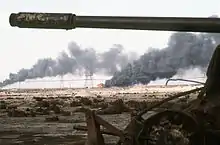Environmental impact of Gulf wars
Note: Various sources name these wars differently. For more information please read Gulf War (disambiguation).

Persian Gulf countries especially Kuwait and Iraq faced the serious environmental disasters because of the actions of the Iraqi government during the 1991 Gulf war and 2003 Iraq war.
Wars
- The Iran–Iraq War from September 1980 to August 1988 killed hundreds of thousands.
- In 1990 Iraq invaded Kuwait claiming that Kuwait was a part of Iraq and that Kuwait stole oil from it. This Gulf war resulted in Operation Desert Storm in which Saddam Hussein was defeated. This was a much smaller war and had an environmental impact.
- In March 2003, the US, UK and Australia invaded Iraq. This again was a much smaller war than the first one, but security situation deteriorated later in the .[1] This Gulf war also had an environmental impact.
The effects
Wars often cause severe environmental and human health effects.
Environment
According to Elaph report the Gulf War is one possible reason for the variable weather in the gulf countries. The use of depleted-uranium-tipped projectiles in Kuwait and Iraq also polluted the Arabian Desert.
After the Gulf War, the absorption of air pollutant increased by 705 percent in Baghdad, which is 887 percent more than the World Health Organization recommendation. In addition, the Kuwaiti oil fires caused a global problem and a hazard to human health. The smoke rose one to four kilometers high and blocked sun shine in the Kuwait region. The smoke reached United Arab Emirates and Iran. Some countries such as Turkey, Syria, and Afghanistan reported black rain.
On January 21, 1991, Iraqi troops opened valves at the Persian Gulf, releasing between four and eleven million oil barrels into the sea. Kuwaiti experts estimate the oil leaks made about 200 lakes. The oil in these pools evaporated, which was expected to create a thick sediment of oil. These residues were absorbed by the desert causing unseen damage. Regarding these, the human health and the underground water was negatively impacted. Additionally, the number of aquatic animals and birds declined dramatically by 100,000-230,000, while 100 mammals were killed.
The actions of the Iraqi forces has had a destructive effect on the soil of the Persian Gulf region. Oil leak from fire wells mixed with gravel resulted in a new layer on the surface of the desert called "tarcrete" with depth of nine feet. All the plant life under these layers died and it is impossible for flora to grow there. However, scientists suggest refraining from eliminating these layers, because when removed, the dunes under the tarcrete will cause massive dunes to travel, destroying everything in their way.
Health
The Gulf wars caused serious health problems in Persian Gulf countries.

Cancer
According to Jamail article the main reason of the rising number of cancer and birth defects is depleted uranium and military weapons in Iraq. Official statistics show a sharp increase in the present age of cancer cases in Iraq. After Gulf War I, many doctors think that the war pollution is probably the reason for the sharp increase of the rate of cancer in Kuwait.
Posttraumatic Stress disorder
In 1995, incidences of posttraumatic stress disorder were high in Kuwait. Approximately 27 percent of Kuwaiti has this psychiatric disorder. 66 percent of those with diagnosable post-traumatic disorder were still dreaming nightmares about some war events. In addition, many boys were dreaming different dreams about Saddam trying to kill them or hurt their families. A documentary movie about affected families was made. A boy saw his father tortured then killed by the Iraqi soldiers; after this the boy lost the ability to speak. Another affected victim has speech problems because Iraqi soldiers forced her to watch her two sons killed.
Reproductive Effects
Dr. Haddad and his colleagues noticed a sharp increase in congenital defects and infertility in Fallujah after it had been bombed by the Americans. Fallujah now has the highest rate of genetic damage in a population at all. Many children now born with two heads, one eye or problems in the nervous system. Scientists said that the rate is fourteen times worse than Hiroshima.
Many scientists believe that Depleted Uranium is the main reason of appearing new disease like new illnesses in the kidney, lungs, liver, and total immune system collapse. In addition, it has been noticed that the number of abortions higher in the busy area of military operations. Families are afraid to have babies. Moreover, because of the second Gulf War many new diseases spread in the region. Also, respiratory diseases increased horribly.
Goldenhar syndrome has also been attributed to the Gulf Wars.
Cleanup
The Persian Gulf countries cooperated to clean up the ruin and prevent future havoc.
Over the years volunteer Kuwaiti divers have been cleaning the benthos. They have extracted two cannons and seven shells. It was common to find a turtle caught in fishing nets. Saudi Aramco was one of the largest contributors to the cleaning process. It provided support to other Oil-response teams, distributing protection equipment and materials. Moreover, many Saudi Aramco employees were involved in volunteer teams to clean up marine life.
The Royal commission in Jubail has established a new program to monitor oil spill or any other chemical materials. In addition, it studies the possibility of oil leakage and how it can be stopped in an emergency situations. Also, Aramco stores additional anti-pollution equipment and ships.
References
- "Persian Gulf Wars". The Columbia Encyclopedia.